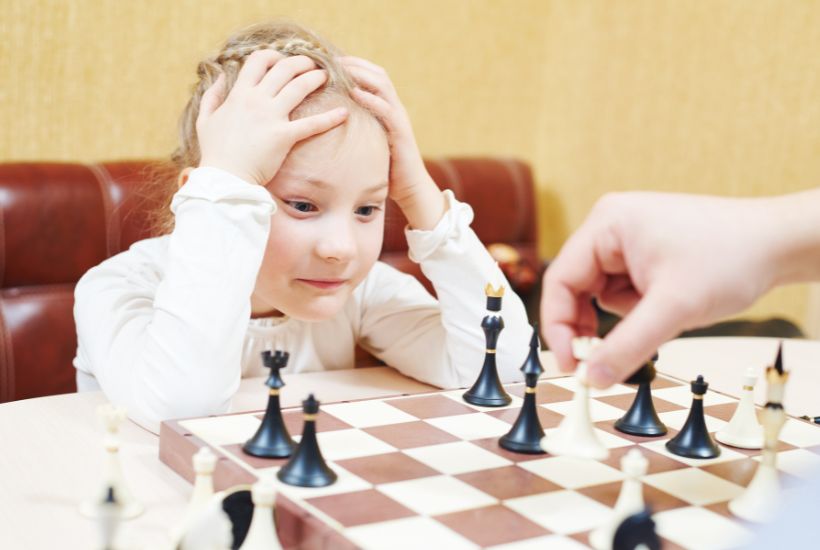How to Help Your Child Focus and Concentrate

It can be challenging to help your child focus. But, as parents, we want our children to succeed in school and beyond.
However, sometimes they find it challenging to stay on task and concentrate for extended periods.
If your child is forgetful or can’t focus; it can be frustrating for both the child and the parent. In this blog post, we will discuss strategies and activities to help strengthen your child’s ability to focus.
We know that with a little effort, you can help make concentration a strength for your child!
21 Ways to Increase Focus.
Here are 21 ways that you can help your child increase their focus without the use of medication:
1) Define the reason behind the lack of focus.
The first step is to help your child understand why they are struggling to focus. If they can identify the reason, they can be more proactive in finding a solution.
2) Get enough sleep.
A lack of sleep can lead to a number of problems, including difficulty concentrating. Make sure that your child is getting the recommended amount of sleep for their age.
3) Encourage them to take breaks often.
When children try to focus on a task, they can get overwhelmed and frustrated. Encourage them to take breaks often so they can return to the task with fresh energy.
A child who is 2 years old can only focus for a couple of minutes at a time. So, take breaks every two minutes when working on a task.
On the other hand, a 13-year-old child can focus for up to 36 minutes. So, they can work for more extended periods of time with shorter breaks in between.
4) Set reasonable expectations
.If you ask your child to do something too difficult or time-consuming, they will likely get frustrated and give up. Set reasonable expectations for what you want them to do.
And be sure to praise them when they meet or exceed those expectations.
This will help boost their confidence and motivation.
5) Break the task into smaller, more manageable parts.
If the task is too overwhelming, help your child break it into smaller parts. This will make it seem less daunting and help them focus on one thing at a time.
For example, if they are studying for a test, help them break the material into smaller sections. They can then focus on one section at a time.
For example, if they are studying for a test, have them break the material down by chapter. Then they can focus on one chapter at a time.
This will help them retain the information better and feel less overwhelmed.
6) Use a timer
Set a timer for the task at hand. This will help your child focus on the task at hand and not get distracted. It also helps them to see how much progress they are making.
For example, if they are studying for a test, set a timer for 25 minutes. Once the timer goes off, they can take a five-minute break.
This will help them stay on track and not get overwhelmed
7) Help them establish a daily routine
A daily routine can help your child stay on track and focus on the task at hand. It also helps to reduce stress and anxiety.
Be sure to include time for homework, extracurricular activities, and downtime in the routine. This will help your child have a well-rounded day and not get overwhelmed.
Encourage your child to stick to the routine as much as possible. And be sure to praise them when they do.
If you’re looking for a simple way to start the day right, try my 1-minute morning routine for kids. This quick, easy routine can help your child feel energized and ready to take on the day.
This will help them feel accomplished and motivated.

8) Spend unstructured time outside
Unstructured time outside can help your child to relax and recharge. In addition, this will help them to be more focused when they return to the task at hand.
Encourage your child to spend at least 30 minutes outside each day. And be sure to limit screen time during this period.
This will help them get the fresh air and exercise that they need to be able to focus.
9) Help them organize their space.
A cluttered and disorganized space can make it difficult to focus. Help your child to organize their homework space, bedroom, or backpack.
This will help them to be more efficient and less distracted.
And be sure to praise them when they keep their space organized. This will help them to see the benefits of being organized and help them to maintain their focus.
10) Focus on healthy nutrition
A healthy diet is essential for concentration. So help your child to make healthy food choices.
Encourage them to eat plenty of fruits, vegetables, and whole grains. And be sure to limit sugary drinks and snacks.
This will help them to have the energy they need to focus and concentrate.
11) Provide healthy snacks while working
A healthy snack can help your child to focus and sustain their concentration.
Encourage them to eat a small snack every two hours while working.
And be sure to include healthy choices like fruits, vegetables, nuts, whole grains, and protein-rich foods.
This will help them to have the energy they need to stay focused.
12) Drink a lot of water
Dehydration can cause fatigue and make it difficult to focus. Help your child to drink plenty of water throughout the day.
Encourage them to drink eight glasses of water each day. And be sure to limit sugary drinks and caffeine.
This will help them to stay hydrated and focused.
13) Avoid multitasking
Multitasking can actually make it more challenging to focus. Help your child to avoid multitasking.
Encourage them to focus on one thing at a time. And be sure to encourage them when they do.
This will help them see the benefits of focusing on one thing at a time and help them maintain their focus.
14) Talk about how they’re feeling.
Sometimes children have a hard time focusing because they are anxious or stressed. Help your child to identify how they’re feeling.
Encourage them to talk about what is making them feel stressed or anxious. And be sure to provide support and encouragement.
This will help them to feel more in control and help them to focus.
15) Help them to find a hobby.
A hobby can help your child to relax and recharge. Help your child to find a hobby that they enjoy.
Encourage them to spend time doing their hobby every day. And be sure to praise them when they do.
This will help them see the benefits of having a hobby and help them to maintain their focus.

16) Encourage them to move.
Physical activity can help to improve concentration. So help your child to get moving.
Encourage them to spend time doing physical activity every day.
This will help them to see the benefits of being active and help them to maintain their focus.
17) Practice meditation
Meditation can help to improve focus and concentration. Help your child to practice meditation.
Encourage them to spend time doing meditation every day. And be sure to praise them when they do.
This will help them to see the benefits of meditation and help them to maintain their focus.
18) Declutter and minimize distractions.
Too many distractions can make it difficult to focus. Help your child to declutter their space and minimize distractions.
Encourage them to spend time decluttering their space and removing distractions. And be sure to praise them when they do.
This will help them see the benefits of having a clutter-free space and help them maintain their focus.
19) Limit screen use or, better yet, eliminate it.
Screens can be a major distraction. Help your child to limit their screen use or, better yet, eliminate it.
Encourage them to spend time away from screens. And be sure to praise them when they do.
Avoid having screens in your child’s workspace or their room. This will help them to see the benefits of being screen-free and help them to maintain their focus.
20) Encourage them to read.
Researchers have shown that reading can help you maintain your focus. Reading books exercises the prefrontal cortex, which is responsible for concentration and attention. So 30 minutes daily to read may help you improve your attention span and memory.
21) Practice visualization
Visualization is a technique that can help you focus and increase your concentration. Help your child to practice visualization.
In reality, Researches show that visualizing movement changes the structure of our brain networks, generating more connections between regions.
It primes the brain and body for action by stimulating areas involved in movement rehearsal in the putamen, such as the forebrain.
Encourage them to spend time visualizing their goals. And be sure to praise them when they do.
This will help them to see the benefits of visualization and help them to maintain their focus.

Why is it so hard for my child to focus?
Several factors can contribute to difficulty sustaining attention.
The following are some of the reasons why your child might not be able to focus.
The child doesn’t understand the task.
The child may not be able to focus because they do not understand what is being asked of them. Make sure that your child understands the task at hand before expecting them to complete it. If they are struggling, help them break it down into smaller goals.
The task is too easy or too hard.
If the task is too easy, your child may become bored and lose focus. On the other hand, if the job is too difficult, your child may become overwhelmed and shut down. Therefore, it is essential to find a balance concerning the task’s difficulty.
There hasn’t been enough practice.
If your child is just learning a new skill, they may be unable to focus because they need more practice. In this case, help them break the task down into smaller steps and provide plenty of opportunities for repetition.
The environment is not conducive to concentration.
If the environment is too stimulating or boring, it can be challenging for your child to focus. Make sure that there is not too much going on around them and that they are in a comfortable space.
They are hungry or tired.
It is difficult to focus when you are hungry or tired. Therefore, ensure your child has had a nutritious meal and ample rest before expecting them to concentrate.
Lack of motivation
It can be hard to focus on something we do not find interesting. Try to help your child find meaning in the task and see how it fits into the bigger picture. This will help increase their motivation.
Different learning style
We all learn differently. Some of us are visual learners, while others are auditory or kinesthetic learners. If your child is having trouble focusing, it could be because they are not being engaged in a way that suits their learning style. Try different methods and see what works best for them.
Didn’t get enough sleep
Children need to get enough sleep. A lack of sleep can lead to a number of problems, including difficulty concentrating. So make sure your child gets the recommended amount of sleep for their age.
Lack of structure and organization
Without a clear plan or structure, it can be hard for children to know what to do and how to focus.
Children thrive on routine and predictability. So try to help them establish a daily routine that includes time for homework and other activities.
In addition, help them organize their space so that they know where everything is and can find what they need quickly.
Help your child by breaking the task into smaller goals and providing a timeline. This will help them see the roadmap to success.
School Anxiety
For some children, the school can be a source of anxiety. This can lead to difficulty concentrating in class. If you think this might be the case for your child, talk to their teacher or guidance counselor. They may be able to help your child identify and manage their anxiety.
Learning difficulties
Some children have difficulty concentrating because they have a learning disability.
Learning disabilities like ADHD, dyslexia, and dyscalculia can make it hard for children to focus. Talk to their doctor or school counselor if you think your child might have a learning disability. They can help you get your child the help they need.
Too much screen time
We live in a world where children are constantly bombarded with screen time.
It is important to limit screen time and help your child find other activities they enjoy. Too much screen time can lead to attention problems and make it difficult for children to focus.
There are many reasons why a child might have difficulty focusing. By taking the time to identify the cause, you can help your child find the strategies and activities that will work best for them. With some help, all children can learn to focus and succeed.
What to do if your child can’t focus?
If your child can’t focus, the first thing a parent needs to do is understand the reasons that could be contributing to the problem.
You need to have open conversations and create an inviting environment where they feel comfortable discussing any problems they may have.
Be supportive, help them find meaning in the task, and see how it fits into the bigger picture. This will help increase their motivation.
Adapt the learning style to better fit your child, use different methods and see what works best for them.
Lastly, help them establish a daily routine with time for homework and other activities.
A lack of focus can be problematic for any child, but with help from parents, they can overcome this hurdle.

Activities to improve concentration and focus.
- Open-ended play
- Exploring nature
- Construction play
- Puzzles
- Painting
- Drawing
- Listening to music
- Yoga
- Cooking
- Baking
- Solving problems together
- Create a treasure hunt
- I-spy game
- Self-talk
- Positive affirmations
- Sensory play
- Essential oils
- Fidget toys
- Visual aids
- Chores
- Seek and Find books
- Executive functioning activities
Finally
Take it easy, and don’t pressure yourself or your child. Help your child focus using these strategies and activities, but don’t expect perfection.
Concentration is a skill that takes time and practice to develop. Be patient and be sure to praise your child when they do show improvement. With time and practice, they will improve their ability to focus and sustain attention.
By following these tips, you can help your child to focus and improve their concentration.
These strategies and activities will help strengthen their attention muscle and help them succeed in school and life.
If you found this post helpful, please share it with others. Thanks!







2 Comments
Comments are closed.